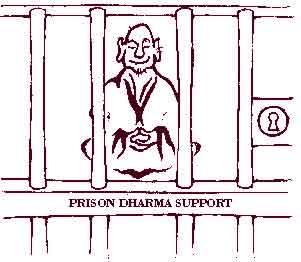BRM Projects - Buddhists in prison

|
Most of us live our entire lives without giving prison life a second thought. Many have never even known anyone serving a sentence. For certain segments of the US population, however, prison is too much a reality, with relatives, neighbors, and friends more likely to be incarcerated than away at school. Prison populations in the US are heavily drawn from black, Hispanic, and other minority communities. Those deeply concerned with justice are troubled by the fact that although five times more whites than blacks use drugs, fully two thirds of all those jailed for drugs are black. Another minority with a growing prison representation is Asian, particularly young Indochinese refugees. There are, for example, more than 2000 Khmer (Cambodians) currently in prisons around the US. |
|
|
In the bitter, angry, depressing atmosphere of prison, Buddhism can offer much needed hope and give a positive structure to life. The moral discipline of Buddhism's Five Precepts-not to kill, not to steal, not to commit sexual misconduct, not to lie, and not to use intoxicants, alcohol, or drugs-might have kept them out of trouble in the first place.... Buddhist Relief Mission has been involved with Buddhist groups in prisons for several years. These groups are not heavily Asian. They were started by US born prisoners.... The prison system is sometimes hostile to Buddhists (or followers of any faith other than Christianity). Buddhist inmates often must overcome formidable barriers to obtain Dhamma books or to have an opportunity to practice meditation with qualified teachers from the outside. Fortunately, a few Christian chaplains have shown themselves to be fairly tolerant and sometimes even supportive of our friends' efforts.... |
||
 |
|||
BRM
attends annual prison ceremony in Washington
Registered address:
7414 Kenrob Drive SE
Grand Rapids, MI 49546, U.S.A..
Office:
152/1 Riverdale Road
Anniwatte, Kandy 20000
Sri Lanka
Tel: 94-77-964-9292
E-mail: buddhist@brelief.org
